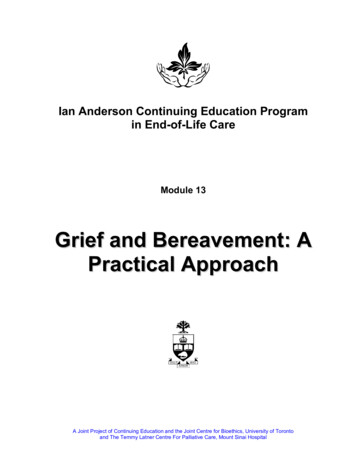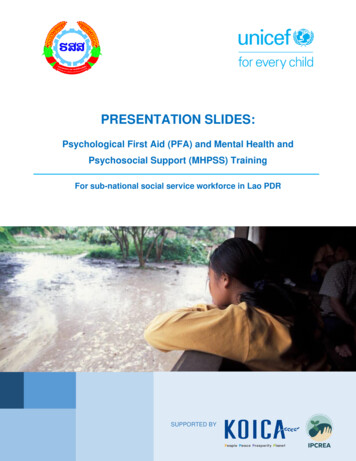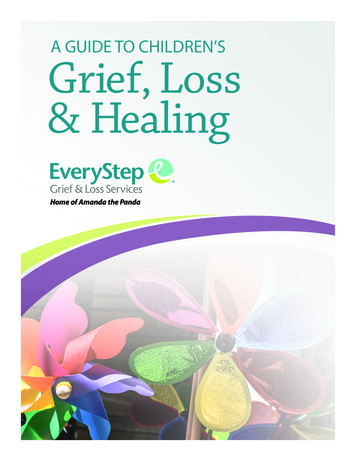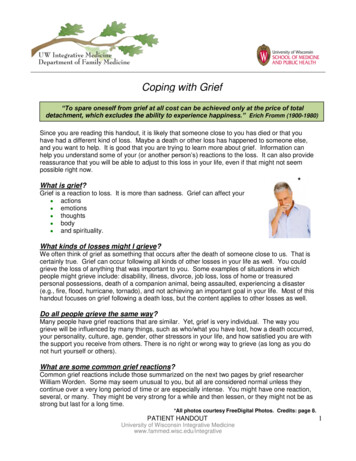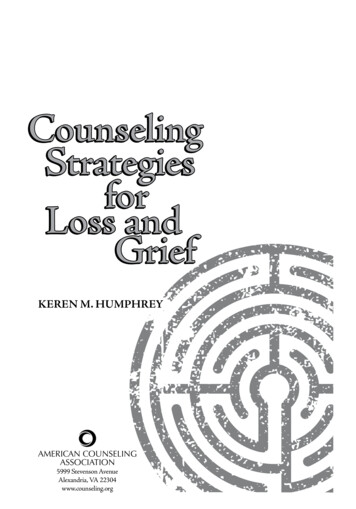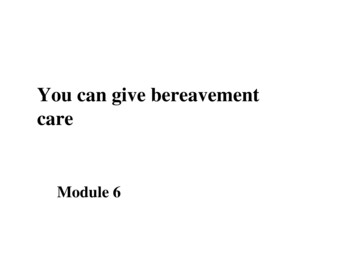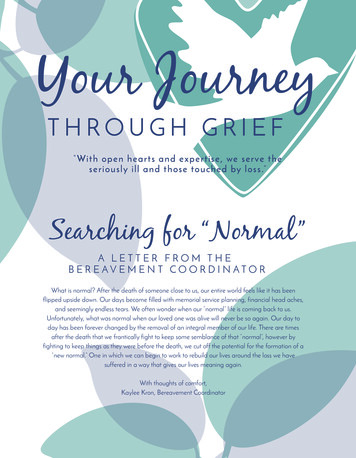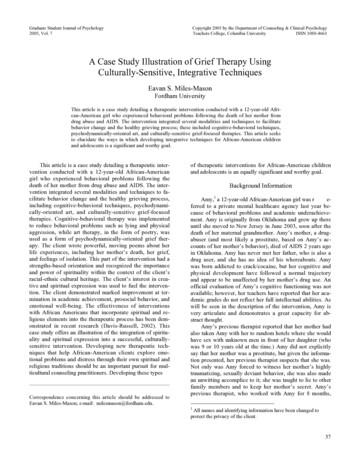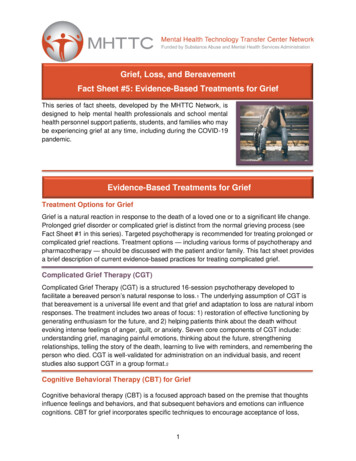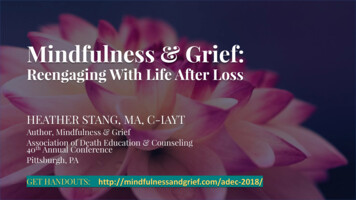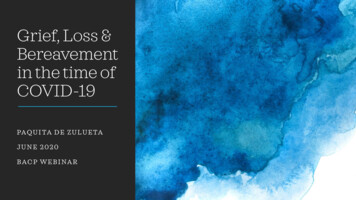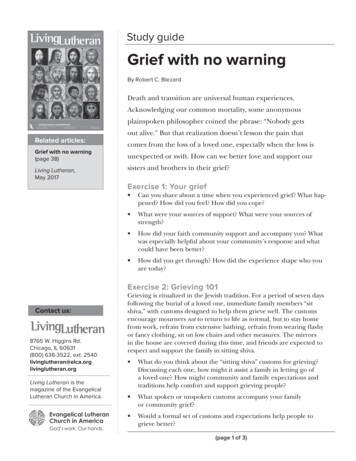
Transcription
Study guideGrief with no warningBy Robert C. BlezardDeath and transition are universal human experiences.Acknowledging our common mortality, some anonymousplainspoken philosopher coined the phrase: “Nobody getsout alive.” But that realization doesn’t lesson the pain thatRelated articles:Grief with no warning(page 38)Living Lutheran,May 2017comes from the loss of a loved one, especially when the loss isunexpected or swift. How can we better love and support oursisters and brothers in their grief?Exercise 1: Your grief Can you share about a time when you experienced grief? What happened? How did you feel? How did you cope? What were your sources of support? What were your sources ofstrength? How did your faith community support and accompany you? Whatwas especially helpful about your community’s response and whatcould have been better? How did you get through? How did the experience shape who youare today?Exercise 2: Grieving 101Contact us:8765 W. Higgins Rd.Chicago, IL 60631(800) 638-3522, ext. g Lutheran is themagazine of the EvangelicalLutheran Church in America.Grieving is ritualized in the Jewish tradition. For a period of seven daysfollowing the burial of a loved one, immediate family members “sitshiva,” with customs designed to help them grieve well. The customsencourage mourners not to return to life as normal, but to stay homefrom work, refrain from extensive bathing, refrain from wearing flashyor fancy clothing, sit on low chairs and other measures. The mirrorsin the house are covered during this time, and friends are expected torespect and support the family in sitting shiva. What do you think about the “sitting shiva” customs for grieving?Discussing each one, how might it assist a family in letting go ofa loved one? How might community and family expectations andtraditions help comfort and support grieving people? What spoken or unspoken customs accompany your familyor community grief? Would a formal set of customs and expectations help people togrieve better?(page 1 of 3)
Study guide: Grief with no warningcontinuedExercise 3: Helpful supportPreparing a meal for a grieving family goes a long way in showing support and love. List as many helpful gestures of kindness that you canthink of for a faith community to support and love a grieving family.Are any of these formalized in a congregational program or statementof guidance? Would it be helpful if they were?Exercise 4: Unhelpful commentsReprints:Permission is granted forindividuals, small groupsand congregations to reproduce this study guide forlocal use.Tell us:Do you find this guidehelpful? Send comments andsuggestions to rcblezard@embarqmail.comBecause people just don’t know what to say, they can sometimesthoughtlessly utter unkind or unhelpful comments to those experiencing grief. Look at the following comments and explore why they mightbe unhelpful: She’s in a better place now. I know just what you’re going through. Life goes on. I guess God needed another angel. Time heals all wounds. He’s looking down from heaven. Everything happens for a reason. God took him. I guess God had a plan. You’ll get over it.Can you think of any other unhelpful comments?Contact us:8765 W. Higgins Rd.Chicago, IL 60631(800) 638-3522, ext. g Lutheran is themagazine of the EvangelicalLutheran Church in America.By contrast, how might these comments be helpful? I’m sorry for your loss. I don’t know what to say. Nobody knows why these things happen. She will be missed. I will miss her too. I can’t imagine what you’re going through. I’ll pray for you. How can I support you? He was a great person.(page 2 of 3)
Study guide: Grief with no warningcontinuedExercise 5: The grieving processIn her 1969 book On Death and Dying, Elisabeth Kübler-Ross talkedabout five stages of grief: shock, denial, anger, bargaining and acceptance. Though everyone’s grieving process is unique and people grievein their own ways, her ideas provide a general pattern.About the studyguide author:Rob Blezardis an assistant to thebishop inthe LowerSusquehanna Synod.He holdsdegreesfrom Boston UniversitySchool of Theology and theLutheran Theological Seminary at Gettysburg (Pa). From your experience of grief and accompanying others in theirgrief, does Kübler-Ross’ model ring true? Can you explain? How can understanding patterns for grieving help us better to loveand support people who have faced loss? How can it help us betterto grieve too?Exercise 6: Congregational planFor action, come up with a congregational plan to love and supportfamilies in their grief. It could include a tip sheet of “dos and don’ts”for parishioners to accompany one another in their grief. It mightinclude a plan for care and follow-up including meals for the grieving, aschedule for phone calls and visits, and cards.Contact us:8765 W. Higgins Rd.Chicago, IL 60631(800) 638-3522, ext. g Lutheran is themagazine of the EvangelicalLutheran Church in America.(page 3 of 3)
Grief with no warningIn October 2000, my father died after strugglingfor two years with a rare form of non-Hodgkin’slymphoma. Prior to diagnosis, he was a robust,intelligent and loving man of 66 who thought he justhad a bad case of eczema.We who loved him watched him decline rapidlyafter diagnosis, suffering from painful, uncomfortable symptoms and the impact of medications thatboth helped and brought on new symptoms.During the two years of his illness, he sufferedimmensely, coming close to death several times. Buthe rallied to take care of all the loose ends life anddeath bring, including more time for closure. Dadplanned his funeral, wrote a genealogy book andshored up the finances. In short, he took care of allof us as he always had, leaving the work of his lasttwo years as parting gifts.When he did die, he gave us another gift. Dadallowed his family, pastor and beloved cat to bearwitness to his final breaths. His was a beautifuldeath supported with such love by our pastor thatit solidified my return to the faith of my childhood,and without which I doubt I would be in seminary.Two and a half months prior to my father’sexpected death, my aunt Linda lost her husbandsuddenly. I knew after my dad died that, while myemotions were raw and my head easily confusedand overwhelmed, my grief was buffeted with the38By Jennifer Ohman-Rodriguezblessing of having time with my dying loved one—something my aunt and cousins didn’t have.Sixteen years and two days after my uncle’s death,my husband of 21 years, Tony, accidentally drownedwhile on a family vacation. Tony’s death left ourfamily stunned, and a people suffering from theimpact of trauma and addictions were left withouthim as their therapist.Many of my memories from that day containfuzz and static. But I clearly remember wantingAunt Linda as soon as possible because I knew sheunderstood how to shepherd me through the earlydays of this very different grief.How sudden grievers grieveIn Transforming Traumatic Grief: Six Steps to Move fromGrief to Peace After the Sudden or Violent Death of a LovedOne, traumatic grief expert Courtney Armstrongexplains that sudden, unexpected and at timesviolent death sends its grievers quickly and with greatforce into a state of shock that is the brain’s beautifulmechanism for survival in times of fear and trauma.Shock, which is protective at first, is referred toas a freezing reaction and is a precursor to “fightor f light.” This stage of grief may last for weeks,if not months, and develop into traumatic griefover time if proven interventions aren’t part ofthe healing journey.MAY 2017 SPIRITUAL PRACTICES & RESOURCES
SPIRITUAL PRACTICES & RESOURCES LIVINGLUTHERAN.ORG39
Shock makes thinking difficult for the suddenlybereaved at a time when many decisions regardingfuneral, burial and future fly quickly in their face.Add to these decisions the real possibilities andaccompanying stress of funeral delay due to autopsyand/or police involvement. Sudden death is full ofunforeseen obstacles requiring quick decisions ofbereaved brains moving in slow motion.Shock makes thinking diff icult for thesuddenly bereaved at a time when manydecisions regarding funeral, burial andfuture fly quickly in their face.K athleen Gleeson, a licensed master socialworker in Iowa City, Iowa, said, “The main differencebetween grieving a sudden loss versus an anticipatedone is that in a sudden loss, the bereaved often hasa trauma response. The shock overwhelms theperson’s ability to cope with the loss. Sometimesshock and numbness may last for many months,impairing the person’s memory and concentration.”How to love suddenly wellSudden death calls congregations to put love intoaction quickly.Linda Lund, visitation pastor at House of PrayerLut heran Church, Bloomington, Minn., losther husband suddenly. “Pastors are ill-equippedto deal with this type of death [which means]congregations are also,” she said. “[Pastors andcongregations] try very hard to make the pain goaway [when] they can be much more helpful bywalking beside the grieving person as he or shetakes the journey.”Here’s what walk ing alongside a suddenlybereaved person or family can look like: Offer a gatekeeper. If the bereaved lack someonemonitoring the phone calls, texts, emails and doorringers, find someone from the congregationto take on this role. Make sure it’s someone whoknows how to stay in the background. Visit less, unless invited. The first few weeks aftera sudden death aren’t the time for everyone tovisit. That’s what the visitation and funeral are forand why the sympathy card industry is alive andwell. Appoint one person from the congregationbesides the pastor to interface with the bereavedor their gatekeeper. This point person sets up ameal sign-up, makes the deliveries of supplies andfood, and cues congregants as to whether visitsare welcome or not.40 Care for the caregivers. Congregants need spaceto grieve or process sudden death too, but notwith the bereaved family. Organize a time after orbefore worship with grief counselors or chaplainswho can help the congregation process theirfeelings. Listen and listen again. For Gracia Blanchard andthe caring and wellness committee at Gloria DeiLutheran Church, Iowa City, Iowa, support meanslistening above all else while avoiding sharingpersonal stories of grief with the bereaved. Squash worn-out words. Common yet overusedstatements such as, “God has a plan” or “Everythinghappens for a reason,” are often heard by thesuddenly bereaved as pain, not comfort. “Actionsand behaviors that perpetuate grieving come frompastors and people who try to make you better ortry to fix you by using words and Scripture thatonly make the hurting worse,” Lund said. Considertalking less with the suddenly bereaved andlistening while sitting in discomfort more. Develop a caring timeline. C ar ing for t hesuddenly bereaved is a yearlong commitment.Paperwork, carpool and handyman help are allpossible needs of the bereaved family. Periodicinvitations to social events also support thiscomplicated healing process. Support using experts. Time does not heal allwounds. Support those experiencing suddenloss in seeking professional counseling. LowellMichelson, pastor of Lord of Life LutheranChurch, West Chester, Ohio, remembers seekingout professional help when he needed it: “When Ifound myself in unexpected sorrow following amurder in the narthex of a [church] I was serving,I knew that I needed professional help to lead me,[my] family and the congregation through thevalley of the shadow of death.” Be Easter people. Easter people embrace thatafter death there is life with all the saints for thedeceased. At the same time, Easter people canhold high life after death for those still livingon earth by being mirrors of love, resilienceand hope.Easter people embrace that after death thereis life with all the saints for the deceased.MAY 2017
Walking beside and prepared. Sudden deathoccurs. It has been, is and will be part of livinglife together as Christians. Taking time to hearfrom people who have experienced sudden griefcombined with expert advice helps pastors andcongregations understand what actions are trulyhelpful, healing and loving, while minimizingthe inevitable chaos that comes in the wake ofsudden death. Preparation is a congregationalgift worth cultivating ahead of time for theunexpected and suddenly bereaved.Download a study guide by clicking onthe “Spiritual practices & resources” tab atlivinglutheran.org.SUGGESTED READING Transforming Traumatic Grief: Six Steps to Movefrom Grief to Peace After the Sudden or ViolentDeath of a Loved One by Courtney Armstrong(Artemecia Press, 2011). Healing Trauma: A Pioneering Program forRestoring the Wisdom of Your Body by Peter A.Levine (Sounds True, 2008). The Body Keeps the Score: Brain, Mind, andBody in the Healing of Trauma by Bessel van derKolk (Viking, 2014).Jennifer Ohman-Rodriguez is a writer, early childhood development specialist and student at LutherSeminary in St. Paul, Minn. She and her two sons are healing from the sudden loss of her husband,Anthony D. Rodriguez, a certified trauma expert, in 2016. Jennifer attends Gloria Dei Lutheran Church,Iowa City, Iowa, and blogs about life at jenniferohmanrodriguez.com.a largerthan lifeperspectiveAt Carthage, our Lutheran values willprepare you for a calling much biggerthan yourself. Because a college educationshould do more than just get you a job. Itshould help you discover who you are andhow you can work for the greater good.Students traveled to Germany for the Luther and theReformation short-term study tour in January 2016.carthage.eduLIVINGLUTHERAN.ORG41
Lutheran Church, Iowa City, Iowa, support means listening above all else while avoiding sharing personal stories of grief with the bereaved. Squash worn-out words. Common yet overused statements such as, "God has a plan" or "Everything happens for a reason," are often heard by the suddenly bereaved as pain, not comfort. "Actions
